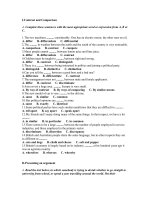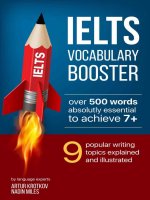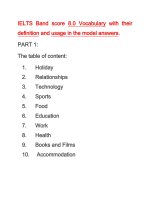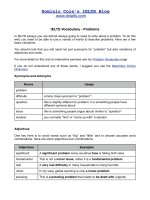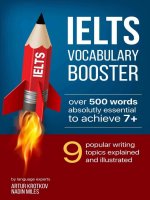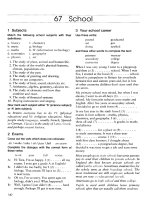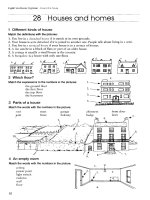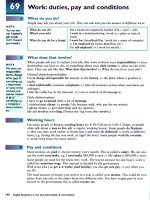IELTS vocabulary Ebook(IM09)
Bạn đang xem bản rút gọn của tài liệu. Xem và tải ngay bản đầy đủ của tài liệu tại đây (869.33 KB, 62 trang )
1|Page
Published by IELTSMaterial.com
This publication is in copyright. All rights are reserved, including resale rights. This e-book is sold subject
to the condition that no part of this e-book may also be copied, duplicated, stored, distributed,
reproduced or transmitted for any purpose in any form or by any means, electronic or mechanical, or by
any information storage and retrieval system without written permission from the author.
Preface
As far as you know, Vocabulary plays an important role in the IELTS exam. Therefore, it is absolutely
necessary that you invest time in learning new words and understanding their usage.
Beside Cambridge IELTS Practice Tests series published by Oxford University Press, IELTS Vocabulary
aims to develop vocabulary skills with language proficiency to help you achieve a high IELTS score. It
contains new words with meanings specific to each related topic along with exercises and a common
essay. When using this e-book, you can learn new words that will help you use it in your IELTS exam and
get a good score.
The authors are convinced that you will find IELTS Vocabulary extremely helpful on your path to success
with the International English Language Testing System.
Don’t just trust to luck in your IELTS exam – the key is practice!
IELTS Material
|
2|Page
Contents
INTRODUCTION ............................................................................................................................................ 6
People and Relationship .............................................................................................................................. 8
Glossary .................................................................................................................................................... 8
Exercises ................................................................................................................................................... 9
Essay ......................................................................................................................................................... 9
Education .................................................................................................................................................... 11
Glossary .................................................................................................................................................. 11
Exercises ................................................................................................................................................. 12
Exercises ................................................................................................................................................. 13
Essay ....................................................................................................................................................... 14
Health ......................................................................................................................................................... 15
Glossary .................................................................................................................................................. 15
Exercises ................................................................................................................................................. 16
Essay ....................................................................................................................................................... 18
Adventure ................................................................................................................................................... 19
Glossary .................................................................................................................................................. 19
Exercises ................................................................................................................................................. 20
Essay ....................................................................................................................................................... 22
Gadgets ....................................................................................................................................................... 23
Glossary .................................................................................................................................................. 23
Exercises ................................................................................................................................................. 24
Essay ....................................................................................................................................................... 25
Places .......................................................................................................................................................... 27
Glossary .................................................................................................................................................. 27
Exercises ................................................................................................................................................. 28
Essay ....................................................................................................................................................... 29
Environment ............................................................................................................................................... 31
Glossary .................................................................................................................................................. 31
Exercises ................................................................................................................................................. 32
Essay ....................................................................................................................................................... 33
Transportation ............................................................................................................................................ 34
Glossary .................................................................................................................................................. 34
3|Page
Exercises ................................................................................................................................................. 35
Essay ....................................................................................................................................................... 36
Culture ........................................................................................................................................................ 38
Glossary .................................................................................................................................................. 38
Exercises ................................................................................................................................................. 39
Essay ....................................................................................................................................................... 40
Business ...................................................................................................................................................... 41
Glossary .................................................................................................................................................. 41
Exercises ................................................................................................................................................. 42
Essay ....................................................................................................................................................... 43
Crime and Law ............................................................................................................................................ 45
Glossary .................................................................................................................................................. 45
Exercises ................................................................................................................................................. 46
Essay ....................................................................................................................................................... 47
Employment ............................................................................................................................................... 49
Glossary .................................................................................................................................................. 49
Exercises ................................................................................................................................................. 49
Essay ....................................................................................................................................................... 51
Leisure......................................................................................................................................................... 52
Glossary .................................................................................................................................................. 52
Exercises ................................................................................................................................................. 52
Essay ....................................................................................................................................................... 53
Answer key ................................................................................................................................................. 55
People and Relationship ........................................................................................................................ 55
Education ................................................................................................................................................ 55
Health ..................................................................................................................................................... 56
Adventure ............................................................................................................................................... 56
Gadgets ................................................................................................................................................... 57
Places ...................................................................................................................................................... 57
Environment ........................................................................................................................................... 58
Transportation ........................................................................................................................................ 58
Culture .................................................................................................................................................... 58
Business .................................................................................................................................................. 59
4|Page
Crime and Law ........................................................................................................................................ 59
Employment ........................................................................................................................................... 60
Leisure..................................................................................................................................................... 60
5|Page
INTRODUCTION
"Learners carry around dictionaries and not grammar books" Schmitt (2010)
Vocabulary is an inevitable part of any language. Grammar is undoubtedly important, but lexis is the
core of the language. Vocabulary is one important way to showcase your proficiency in the language, be
it through speaking, writing or reading. Vocabulary comprises 25% marks in IELTS Writing and Speaking
and plays a vital role in Listening and Reading tests too. Repetition of words proves that you are poor in
vocabulary, and further leads to running short of words while conversing with your examiner. As IELTS is
an English Language Proficiency Test, good homework on vocabulary will help in improving the overall
score. You cannot cram up certain words, and claim your job is done for vocabulary. Many times, testtakers tend to use words without keeping the context in mind. This vocabulary e-book is just the right
choice and will prove to be your best friend.
The topics in this e-book are wisely chosen and mainly focus on what is essential and apt from the exam
point of view and also on the basis of commonly asked questions.
Topics:
•
People and Relationship
•
Education
•
Health
•
Leisure
•
Adventure
•
Gadgets and technology
•
Places
•
Global warming/ Environment
•
Transportation
•
Culture
•
Society
•
Business
•
Crime and law
•
Employment
How is vocabulary important for listening?
Our ears can do wonders. In the listening module, you will be asked to listen to an audio lasting 30
minutes, and you need to understand the meaning of certain words and the context in which it is used.
6|Page
Having appropriate knowledge of words and their meaning along with its pronunciation will help you
crack the answer faster.
Some of your listening questions do not have the same words as the audio; instead, these questions will
have synonyms of the information in the audio. To understand the question, you should be able to
identify the synonym. This is where vocabulary becomes essential in the listening module.
VOCABULARY FOR SPEAKING
You will be asked a couple of questions based on a particular topic, and the whole test lasts around 15
to 20 minutes. So, to use this time fruitfully and to get a good band score, use specific vocabulary
related to the topic. This provides a good impression for the examiner and increases your chances to
score a good band.
VOCABULARY FOR READING
In most of the cases, the words in the reading passage are different from the words in the questions.
That is, the synonyms of the word in the passage is used in the question, which confuses test takers if
they don’t know the words or don’t pay attention. Therefore, it is necessary to know the meanings of
those words to answer the questions correctly. This e-book will introduce you to the vocabulary used in
each context and help you find the answers quickly.
VOCABULARY FOR WRITING
Writing module is considered to be the toughest of them all, mainly because you are asked to write on
an essay topic, graph or letter. You have only 60 minutes to think and write on a given topic, in which
you should ensure that there is good vocabulary too. He or she must know that you know a list of
standard vocabulary and phrases and therefore you deserve a good band score.
Learning to use idioms and phrasal verbs will fine-tune your English.
Idioms are a group of words established by usage as having a meaning not deducible from those of the
individual words. For example-’ over the moon’, ‘paint the town red’. Idioms can be used to avoid
repetition of words. However, it is difficult to learn and use them in the right context. This e-book
consists of idioms and phrases for each topic which would help you ace the IELTS exam like a pro.
Collocation refers to words that are commonly placed together. It is not only necessary to learn new
words but also to connect them with other words.
Example:
• To make the bed
• To catch a cold
• To come late
Phrasal verbs are verbs used along with prepositions or an adverb. When these two words are
combined, they have a different meaning compared to what each word means on its own.
Example:
"I can't put up with you anymore."
The use of the word "put" in context "to put on the table" means to place. But when it is used with "up
with", the meaning changes to "can't accept someone or something anymore."
This e-book consists of words, idioms and phrasal verbs specific to each topic. In addition to this, each
topic consists of an essay with the words, idioms and phrasal verbs given, providing you with an example
of how an essay can be written with the specific words.
7|Page
People and Relationship
Glossary
Personal relationships
Parent - a mother or father of a person
Sibling - a brother or sister
Spouse - a person's husband or wife
Grandparents - the father or mother of a person's father or mother
Professional relationships
Client - a customer or someone who receives services
Employer - a person or organization that employs people
Employee - someone who is paid to work for someone else
Colleague - one of a group of people who work together
Characteristics
easy-going - relaxed and not easily upset or worried
broad-minded - willing to accept other people's behaviour and beliefs
consistent - always behaving or happening in a similar, especially positive, way
co-operate - to act or work together for a particular purpose, or to be helpful by doing what someone
asks you to do.
Tolerant - willing to accept behaviour and beliefs that are different from your own, although you might
not agree with or approve of them
Vulnerable - able to be easily physically, emotionally, or mentally hurt, influenced, or attacked
Idealistic - believing that very good things can be achieved, often when this seems unlikely to other
people
Flexible - able to change or be changed easily according to the situation
Charming – pleasant and attractive
Determined - wanting to do something very much and not allowing anyone or any difficulties to stop
you
Lively - full of energy and enthusiasm; interesting and exciting
Clumsy – A person who often has accidents because they do not behave in a careful, controlled way
Arrogant - unpleasantly proud and behaving as if you are more important than, or know more than,
other people
8|Page
Social Scientists- an expert in or student of human society and social relationships, or any subject within
this field, such as economics or politics.
Cultural gap- is any systematic difference between two cultures which hinders mutual understanding or
relations.
Intergenerational- relating to, involving, or affecting several generations.
Exercises
A. Fill in the blanks with the correct relation.
1.
2.
3.
4.
5.
Ever since marriage, my _______ cooks’ dinner.
My ______ are celebrating their 60 anniversary.
My _________ is extremely happy with the output of this project.
As a boss, I prefer sincere ________ to lazy ones.
Meetings with my _______ are fun instead of stressed.
th
B. Use the right word in the blank.
6.
7.
8.
9.
10.
She is _______. She keeps falling down.
If you would ________, we could finish it before the deadline.
I don’t judge people, I am very __________.
I can’t stop staring at him. He’s really ________.
I’m _______ to win this show.
Essay
There is certainly a difference in thoughts, ideas and actions between children, their parents and
grandparents. Why do these differences exist? Does it cause problems in your community, in your
opinion?
In a rapidly developing world, the differences in opinion, attitude and lifestyle of children from those
of parents and grandparents is obvious. This can be due to several reasons ranging from the invention
of new technologies to the influence of western cultures. From my personal standpoint, differences in
viewpoints do leads to various problems such as lack of intergenerational communication.
Emerging technologies such as smartphones, mobile applications, laptops and video games create
a cultural gap between two generations. While the parents prefer personal one-on-one interaction,
children use Facebook and Twitter to communicate with friends. The gap is further increased by the
spread of western ideas in developing countries. This is evident in the difference in the food habits of
parents and their children. The former prefers traditional homemade food, whereas the latter prefers
burgers and junk food. A recent survey conducted in India claimed that western cultural influence
spread through international brands such as Levi’s, McDonald's, KFC and Facebook and had decreased
the time children spent with parents in 2019 by at least 35 per cent as compared to 1998. This has
tremendously increased the differences in thoughts, ideas and actions between the two generations.
9|Page
Because the older generation is not always broad-minded, their stubborn beliefs lead the youth to
turn arrogant and clumsy.
These cultural differences result in a lack of communication between two generations which leads to
improper guidance for youth on one hand and loss of cultural identity on the other. Social
Scientists have proved that if children and parents do not spend sufficient time eating food and
discussing ideas, events, history and culture, a community will forget its culture within five generations.
In conclusion, the differences in ideas and attitude of children and parents are natural. However, these
may seriously affect the development of a society and lead to a loss of identity. The differences should
be bridged by encouraging the parents and children to spend more time with each other, and I believe
that the COVID-19 pandemic has paved a way to strengthen family bonds.
10 | P a g e
Education
Glossary
School
Kindergarten/ Elementary - the first year of school, for children aged five.
Middle school - a school for children between the ages of about nine and 14.
High school - a school in the US for older children, usually children from grades 9-12, or aged
approximately 14-18.
Curriculum - the subjects studied in a school, college, etc. and what each subject includes.
Absent - not in the place where you are expected to be, especially at school
Break - to interrupt or to stop something for a short period
Educate - to teach someone, especially using the formal system of school, college, or university.
Dictionary - a book that contains a list of words in alphabetical order and explains their meanings, or
gives the word for them in another language; an electronic product giving similar information on a
computer, smartphone, etc.
Course - a set of classes or a plan of study on a particular subject, usually leading to an exam or
qualification.
Handwriting - a person’s style of writing done with a pen or pencil.
School subjects
•
•
Maths
Science
o
o
o
•
•
•
•
•
•
•
•
Physics
Chemistry
Biology
Literature
Language
History
Geography
Music
Art
Information technology
P. E (Physical Education)
11 | P a g e
Exercises
There are dialogues from students on side B and the subjects on Side A. Match these dialogues with
the subjects.
Side A
1. Maths
2. Biology
3. Chemistry
4. Literature
5. P. E
6. Music
7. History
Side B
A. I enjoyed reading the book assigned to us last week. The author had written it
brilliantly.
B. I was told that we would be learning one instrument along with vocals this year.
C. I find it extremely difficult to avoid careless mistakes while I do my sums.
D. The beaker broke when I turned around to pick up the test tube.
E. I tend to forget the dates during the exam. Why couldn’t they have fought all the
wars in a single period?
F. I tried not to puke when they told me to dissect a frog.
G. I managed to act sick when he called me to exercise today.
Read this conversation and identify the words related to education. Also find the meaning of these
words according to context.
I cannot believe that our child has started kindergarten. In no time, she will be learning art, alphabets,
music and another language. It’s all in her curriculum. I can’t wait to hear all about it. I hope her teacher
appreciates her handwriting. She’s always been tone-deaf – I hope she changes and begins to love music
as much as I do.
8………………….
9…………………..
10…………………
11…………………
12…………………
13…………………
14…………………
15…………………
University
Degree - a course of study at a college or university, or the qualification given to a student after he or
she has completed his or her studies.
University - a place where people study for an undergraduate (= first) or postgraduate (= higher level)
degree.
Certificate - the qualification that you receive when you are successful in an exam.
Course - a set of classes or a plan of study on a particular subject, usually leading to an exam or
qualification.
Diploma - a document given by a college or university to show that you have passed a particular exam
or finished your studies.
12 | P a g e
Graduate - a person who has a first degree from a university or college.
Enrol - to put yourself or someone else onto the official list of members of a course, college, or group.
Attend - to go officially and usually regularly to a place, in this case a university.
Lecture - a formal talk on a serious subject given to a group of people, especially students.
Faculty - the people who teach in a department in a college.
Presentation - a talk giving information about something.
Dissertation - a long piece of writing on a particular subject, especially one that is done in order to
receive a degree at a college or university.
Tutorials - a period of study with a tutor involving one student or a small group.
Thesis - a long piece of writing on a particular subject, especially one that is done for a higher college or
university degree.
Hypothesis - an idea or explanation for something that is based on known facts but has not yet been
proved.
Research - a detailed study of a subject, especially in order to discover (new) information or reach a
(new) understanding.
Qualification - an official record showing that you have finished a training course or have the necessary
skills, etc.
Exercises
Summary Completion
Fill in the blanks with the appropriate words from the table below.
Words
lecture
tutorials
faculty
enrol
course
degree
university
I have decided to 16________ in the Creative Writing 17_____ held at Crawford 18________. I will be
earning a post-graduate 19_______ if I complete this course. One of the reasons why I want to enrol to
this course in this university is because it has good 20________ and they also conduct one to one
21_________ in addition to the22 _________ every week.
13 | P a g e
Essay
‘Education is not a luxury, but a basic human right & as such, should be free for everyone irrespective
of personal wealth. Do you agree or disagree?’
As they say,” Education is the passport to the future”, it is a vivid indicator of development and
therefore is indispensable. I agree with the view that education, in particular, the primary level of
education should be free for everyone but with the intention of receiving better knowledge. This essay
focuses on why education should be free and what we can expect from the government.
I agree that anything which is made free, declines in its value and education can lose its quality. But it is
also true that people know how valuable education is, and it is the only ladder to help reach the goals
they dream of. In short, if everyone gets free education, they at least have a chance to reach the basic
level of education irrespective of the quality. It could be their road to success and indirectly help the
nation prosper.
However, nothing comes for free. It is a stable source of earning for thousands or millions of people to
support their lives. In India, government schools provide free education and teachers are paid a huge
amount as salary. I had a six-month training in a government school, where children in 8th standard are
still learning English alphabets. So, the quality of education depends on the money one spends. So, the
government should take initiatives to provide quality education at affordable rates.
To conclude, I would say that the intention of getting educated is to gain knowledge and earn a fixed
promise for a better life and not do it for the sake of it. More facilities should be provided to individuals
since childhood, aiming at a better future.
14 | P a g e
Health
Glossary
Fitness- the condition of being physically fit and healthy.
Healthiness-the condition of being physically fit and healthy.
Heartiness-The characteristic of being hearty; fillingness; wholesomeness.
Robustness- the quality or condition of being strong and in good condition.
Sap-the fluid which circulates in the vascular system of a plant, consisting chiefly of water with dissolved
sugars and mineral salts.
Soundness-the state of being in good condition
Verdure-lush green vegetation.
Wellness-the state of being in good health, especially as an actively pursued goal.
Fettle- condition.
Shape-the external form, contours, or outline of someone or something.
Cleanliness-the state or quality of being clean or being kept clean.
Hygiene-conditions or practices conducive to maintaining health and preventing disease, especially
through cleanliness.
Hardiness-the ability to endure difficult conditions.
Lustiness- the quality of being healthy, energetic, and full of strength and power
Ruggedness: the property of being big and strong.
Stamina-the ability to sustain prolonged physical or mental effort.
Strength-the quality or state of being physically strong.
Vigor-physical strength and good health.
Vigorousness-very forceful or energetic
Vitality-the state of being strong and active; energy.
Bloom-a flower, especially one cultivated for its beauty.
Flush- become red and hot, typically as the result of illness or strong emotion.
15 | P a g e
Activeness-the trait of being active; moving or acting rapidly and energetically.
Agility-ability to move quickly and easily.
Liveliness-the quality of being outgoing, energetic, and enthusiastic.
Spryness-ease and grace in physical activity.
Weal-a red, swollen mark left on flesh by a blow or pressure.
Well-being-the state of being comfortable, healthy, or happy
Condition-the state of something concerning its appearance, quality, or working order.
Form-the visible shape or configuration of something.
Kilter-out of harmony or balance.
Toughness-the state of being strong enough to withstand adverse conditions or rough handling
Wholeness-an undivided or unbroken completeness or totality with nothing wanting
Wholesomeness-the quality of being beneficial and generally good for you.
Welfare-the health, happiness, and fortunes of a person or group.
Exercises
A.
Match the sentence in the left-hand column with a sentence in the right-hand column. Use the
words and phrases in bold to help you.
1. Mrs. Andy suffers from cold-sore, due to which
a) Sudden clouding of the eye’s lens and is the
she is unable to eat or chew.
leading cause of blindness.
2. Sam has red rashy cheeks that spreads across
b) Mammogram helps detect this second most
the bridge of the nose, doctors say it is
common type of cancer found in woman.
Lupus.
3. Mrs. Jane is not able to see properly it seems
c)Red painful fluid-filled blister that appears near
she is suffering from Cataract.
the mouth and lips.
4. Angel felt little painful lumps on her breasts
d)Scary red patches that looks like butterfly
wings on the nose.
16 | P a g e
and later detected that she had breast cancer.
5. Mrs. Parker is suffering from Melanoma, a
e) A virus spread by an infected animal biting
type of skin cancer.
another person or animal.
6.John has rabies, he was bitten by his pet.
f) Invades nearby tissues and spreads to other
parts of the body.
B. Replace the words or phrases in bold in these sentences with a word or phrase from the box so that
the sentence sounds more natural. There are three words or phrases that you do not need.
Active
a diet
minerals
consultant
operation protein
conventional medicine debilitating diagnoses vitamins
surgeon therapeutic traditional medicines holistic medicine
7.If you suffer from a bad back, a massage will be able to cure or relieve the disorder.
8. A key to good health is to choose the right type of food to eat, that is high in fiber and low in fat.
9.Most people rely on modern pills and tablets when they are ill, to cure them.
10.Some old-fashioned cures for illnesses, such as herbal tablets and remedies, are becoming
increasingly popular these days.
11.Many people are turning to treatments which involve the whole person, including their mental
health, rather than just dealing with the symptoms of the illness.
12.Doctors sometimes refer their patients to a medical specialist attached to a hospital.
13.It takes many years of training to become a doctor specializing in surgery.
14.Meat, eggs and nuts are rich sources of a compound which is an essential part of living cells, and
which is essential to keep the human body working properly.
17 | P a g e
15. On his holiday, he had to take essential substances which are not synthesized by the body but are
found in food and are needed for growth and health, because the food he ate lacked the B and C
groups.
16.Calcium and zinc are two of the most important substances found in food.
Essay
Stress is now a major problem in many countries around the world. What are some of the factors in
modern society that cause this stress, and how can we reduce it?
One of the most prominent issues that society deals with today is stress. Stress is a problem that can
have a detrimental effect on many people's lives. There are many factors in modern society responsible
for this. However, there are ways to make a gradual yet potential impact. In this essay, I will discuss the
factors causing it and the methods to reduce it.
To begin with, everybody dreams of a better living. The constant thrives to attain goals can be
depressing at times. The fight for survival, however, begins with a healthy competition with their
counterparts. This constant routine can become a never-ending battle. Furthermore, some people have
a notion that happiness is of those who have all the luxuries of life. Stress begins with teenage. At that
age, they are not only pressured to accept the physical and emotional changes but also made to
struggle fiercely to become an ideal person according to the norms set by society. In other words,
everyone experiences stress and dissatisfaction with themselves and their lives, be it on the personal or
professional front.
Nevertheless, solving such problems is difficult but not impossible. Better time management will help in
reducing stress. Time management includes setting priorities and what needs to be done most
importantly. For example, students can prepare their study schedule before they have an important
test. Moreover, strengthening the bond with their families and friends can often help one realize that
they all sail in the same boat and that their problems at times are not much considering what other
people go through.
In conclusion, I would like to say that stress does come in some or the other way. But it is important to
learn to deal with it. From loving oneself to believing the inner strength that we all are born with, there
are several ways to overcome stress. Having a clear goal with positive intentions and determination can
help in boosting oneself to bring order in life and relieve stress.
18 | P a g e
Adventure
Glossary
Experience: Practical contact with and observation of facts or events.
Trip: A journey or voyage.
Exploit: A program or technique.
Feat: An act or accomplishment of great courage, skill, or imagination; an achievement.
Scene: The place where an incident in real life or fiction occurs or occurred.
Contingency: a future event or circumstance which is possible but cannot be predicted with certainty.
Endangerment: The action of putting someone or something at risk or in danger.
Enterprise: A willingness to undertake new or risky projects; energy and initiative.
Jeopardize: To expose to loss or injury; imperil.
Chance: An unpredictable event or accidental happening
Undertaking: The act of one who undertakes, or engages in, any project or business.
Occurrence: an incident or event.
Venture: An undertaking that is dangerous, daring, or of uncertain outcome.
Emprise: (Archaic) The qualities which prompt one to undertake difficult and dangerous exploits;
chivalric prowess.
Hazard: Chance or an accident.
Peril:(Insurance) An event which causes a loss, or the risk of a specific such event.
Happening: an event or occurrence.
Incident: an instance of something happening; an event or occurrence.
Venturesome: willing to take risks or embark on difficult or unusual courses of action.
Dido: A mischievous or foolish action
19 | P a g e
Escapade: Archaic) An escape from restraint or confinement.
Brash: Impetuous or rash
Daring: Courageous, or showing bravery.
Incautious: Careless, reckless, not exercising proper caution.
Quest: The definition of a quest is a search to find something or to achieve a goal.
Risky: involving risk; hazardous; dangerous
Speculative: The definition of speculative is based on thoughts not evidence.
Temerarious: Reckless; rash
Frolic: A playful trick; prank
Inertia: A tendency to remain in a fixed condition without change; disinclination to move or act
Passiveness: The condition of being passive; passivity.
Latency: The state or quality of being latent.
Saga: A long detailed report:
Vagary: Vagary is an odd, unexpected action.
Exercises
1.Fill in the blanks with the phrases given in the box below:
find a gem
To take a red eye
Break the journey
a stopover
Put me on standby
The first leg of the journey
Off the beaten path
To get away
Get itchy feet
Off the beaten track
To take the road less traveled
20 | P a g e
1. I had an arduous journey to the South of Vietnam last year. I thought I would
___________________somewhere but I finally did it all in one go.
2. Try to find a local guide when you visit a foreign country to successfully _________during your
trip.
3. I had _________ in China on the way to Thailand, had a bit of a rest, and did the sights there
before travelling on.
4. Last week I got a flight on a low-cost airline to Paris. I then tried to get a flight to the UK but
they were all full, so they _________.
5. My best friend is an intrepid traveler who has a real sense of adventure. He always loves to set
out on a journey______________.
6. Adventurous travelers like_____________ when visiting a new country.
7. _____________________ got me to the UK but it just gave me very little indication of what lay
ahead.
8. Travellers these days make the effort to get off the tourist trail and look for ________
destinations to experience the raw beauty of the country.
9. I had __________ and now I’m exhausted.
10. Last week, I had a great chance __________from the hustle and bustle of the city to visit an
ancient village in the countryside.
11. I’ve always had a thirst for adventure and often _________so I decided to set out on a journey
from the North to the South of Australia next month.
2.Replace the underlined words from the article and replace it words given the box below:
Adventure tourism is to a great degree confounding term. The meaning of this term changes from
individual to individual, association to association. Notwithstanding, the closest definition to what the
majority would agree is a 12. outside activity including the common habitat where the result seen by
the members is obscure.
It is hard to follow its origin yet first 13. encounter explorers were dealers. Erickson found North
America. Columbus found America and Vasco Da Gama discovered India. Yet, that was when
modernization had not been a part of our day to day lives.
The adventure travel as we probably are aware it today started three and kept decades down when
individuals began investigating the Nepalian Himalayan mountain ranges. The 14. travelers found the
greater part of this coincidentally. They 15. aimed Bhutan, Afghanistan, Algeria, Bali, Nile and as of late
the Alps. On the planet, individuals have been going around however in India experience has grown
calm as of late. Be that as it may, the ascent has been relentless and India is accepted to be one among
the main ten destinations of the world.
21 | P a g e
Essay
Nowadays many young people are drawn towards dangerous sports. What makes them so attractive?
What measures should be taken to regulate such sports and minimize the risks?
It is an undeniable fact that people, especially youth, are going crazy after adventurous and
thrilling sports. Youngsters are mostly attracted and try these sports without being aware of the dangers
involved. This essay focuses on a few measures that the sports agencies or the government
can undertake.
To begin with, we all know that youngsters are adventurous and courageous. They enjoy trying all kinds
of sports that help them gain attention and experience without realizing that they are endangering
themselves in the process. Social media is one major platform where they get to see such stunts. It is
where they see their friends or celebrities posting videos to gain more likes and followers. But what they
fail to understand is that all the stunts are performed under strict supervision.
To prevent the risks associated with these sports, a set of safety guidelines should be distributed to all
the participants beforehand. The organizing team should be well trained and certified to teach
participants all the required skills to handle any difficult situation. The concerned team should
accurately check the health condition of the people and the equipment to avoid mishaps. A rescue
team must be available in case of any mishaps.
In conclusion, it is always fascinating for youngsters to participate in thrilling sports. However, it is
important to know the risks involved and be physically and mentally fit for the sport.
22 | P a g e
Gadgets
Glossary
Appliance: A device or machine for performing a specific task.
Device: The definition of a device is a tool or technique used to do a task.
Invention: A new device, method, or process developed from study and experimentation.
Thingamajig: Something that one does not know the name of.
Gimmick: Anything that tricks or mystifies; deceptive or secret device.
Doodad: Any small object or device whose name is not known or is temporarily forgotten.
Contraption: Figuratively, derogatory or ironic) Any object.
Contrivance: The definition of contrivance is the thing that causes something to happen.
Widget: The definition of a widget is a general term for a small gadget or device.
Gizmo: Any gadget or contrivance.
Doohickey: A thing (used in a vague way to refer to something whose name one cannot recall)
Novelty: In novelty theory, newness, density of complexification, and dynamic change as opposed to
static habituation.
Concern: A matter that relates to or affects one.
Jigger: An article or a device, the name of which eludes one.
Thing: A thought, notion, or utterance.
Point to note: Do not try and learn this list of vocabulary. Identify the vocabulary you find useful for
answering practice questions about technology. Record these in your vocabulary notebook and practice
using them regularly.
23 | P a g e
Exercises
1.Match the information:
1.A person who knows a lot about technology
especially computers or other electronic
equipment.
2. The development and use of a new idea or
method
a) Computer buff
b) to boot up
3. Very modern
4. The latest stage of development of a product,
using the most recent ideas and method and and
including the latest features.
c) to upgrade
d) to surf the internet
5. Something you could not manage without;
absolutely necessary.
6. Not in use anymore, having been replaced by
something better.
7. The effect of something.
8. Someone who knows a lot about
computers and might be considered an expert.
9. To start a computer
e) e-books
10. To obtain a more powerful or feature-rich
computer, electronic device or piece of software.
j) state-of-the art
11. To look at a series of websites one after the
other.
12. A book published in digital form and read on
a computer or other dedicated electronic device.
k) cutting-edge
13. A new idea or factor that significantly changes
an existing situation or way of doing something.
m) a techie
f) game changer
g) impact
h) obsolete
i)Indispensable
i) innovation
2) Use the vocabulary in the exercise above to fill in the blanks:
14. I spent hours ___________searching for the best offers on clothing.
15. Although I have a good understanding of the software I use at work, I certainly wouldn’t call
myself _____________.
24 | P a g e
16. The professor’s new theory was ____________and if proved correct, brought the possibility of
time travel one step closer.
17. Our new mobile phone is still in development but it is at ___________of technology.
18. I’m not surprised Shreya is working for a top computer agency as she was always a real
___________ at school.
19. The best thing about _________ is that you can download them instantly and start reading them
immediately.
Essay
Nowadays the way many people interact with each other has changed because of technology. In what
ways has technology affected the types of relationships people make? Has this become a positive or
negative development?
It is an undeniable fact that with the advent of technology, things have changed for better or worse.
One of the major fields affected is the way people interact and communicate. This essay puts light on
the advantages and disadvantages of high-tech life.
Undoubtedly, technology has changed the way we lead our lives, and these changes are prominent over
the last decade. Technology has impacted our lives, positively and negatively. One area that has
dramatically changed is the way we communicate and maintain our relationship nowadays. And in my
opinion, technology has positively affected our communication and the way we make relationships and
maintain it. Despite some negative effects, most of us enjoy the positive aspects of technology. In the
past, the ways of interaction were very limited.
I completely believe that technology has a great tangible effect on our communication. Nowadays, it's
very easy to interact with your relatives -and even with the government and organisations- either by
emails, mobiles, chatting, etc. and I think that this has improved the relationships and enhanced it.
Especially during this pandemic, everyone is connected with their loved ones even from behind locked
doors. From communicating to raising voice over certain sensitive matters, social media has paved the
way for people to interact and connect instantly. So, technology has helped people come out of their
safe bubbles and open their minds. Children nowadays have learned to open up with their parents.
Thanks to the technology and kind of information they are exposed to.
However, with advanced technology, people have found more ways to exploit this freedom of speech or
action in the form of hate messages or comments, hacking, portraying false identity and much more.
People, whether young or old, is addicted to the internet. People now can deceive others using identity
theft and fraud identity. The personal touch of communication like handwritten letters, face-to-face
communications were more effective in some cases, like meeting your friend is still more important than
just writing him an email.
To conclude, despite all that, I still see some failings in the development of the means of interaction. For
instance, the very high cost each person spends every day on communication. But that doesn't have a
25 | P a g e
